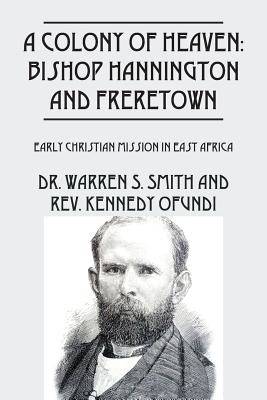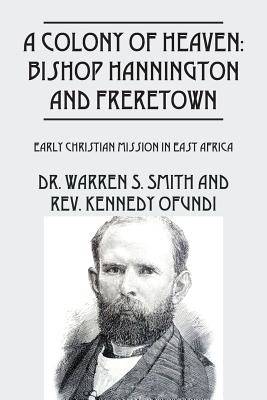
- Afhalen na 1 uur in een winkel met voorraad
- Gratis thuislevering in België vanaf € 30
- Ruim aanbod met 7 miljoen producten
- Afhalen na 1 uur in een winkel met voorraad
- Gratis thuislevering in België vanaf € 30
- Ruim aanbod met 7 miljoen producten
Zoeken
A Colony of Heaven
Bishop Hannington and Freretown - Early Christian Mission in East Africa
Warren S Smith, Kennedy Ofundi
Paperback | Engels
€ 58,95
+ 117 punten
Omschrijving
By 1875, the institution of slavery in East Africa was winding down, after a series of treaties with the Sultan of Zanzibar and in some cases, the forcible seizing by the British navy of slave cargo on the high seas. With the cooperation of the Sultan, a colony was set up by the Anglican church on the coast of Kenya where former slaves (who were in many cases still being pursued by their former masters) were given safety, a plot of land, religious instruction and education. The Freretown project, which included a hospital which serviced Muslims as well as Christians, was a noble experiment and success despite corruption by some of the clergy and the importation of vices from the nearby community into Freretown. James Hannington, the first Anglican Bishop of East Africa, was an idealist who envisioned a native clergy as leaders over the religious community. An impetuous man, he struck out on an overland expedition to Uganda where he and many of his followers were slaughtered at the orders of the 18 year old Kibaka of Uganda who thought the missionaries were trying to invade his country. William Jones, who led survivors of the massacre back to the coast, became a strong leader of the native community and was ordained a priest along with several other natives, but as the 19th century drew to an end many of the African clergy chose to resign in the face of the discrimination and lack of sympathy of the white clergy. It was a time of dreaming, a dream which for a time seemed real, of a society where many Muslims saw a mutual benefit in welcoming Christians to their community, and white clergy saw their role only as training the Africans and then letting them take over.
Specificaties
Betrokkenen
- Auteur(s):
- Uitgeverij:
Inhoud
- Aantal bladzijden:
- 196
- Taal:
- Engels
Eigenschappen
- Productcode (EAN):
- 9781478774013
- Verschijningsdatum:
- 23/04/2016
- Uitvoering:
- Paperback
- Formaat:
- Trade paperback (VS)
- Afmetingen:
- 156 mm x 234 mm
- Gewicht:
- 385 g

Alleen bij Standaard Boekhandel
+ 117 punten op je klantenkaart van Standaard Boekhandel
Beoordelingen
We publiceren alleen reviews die voldoen aan de voorwaarden voor reviews. Bekijk onze voorwaarden voor reviews.











